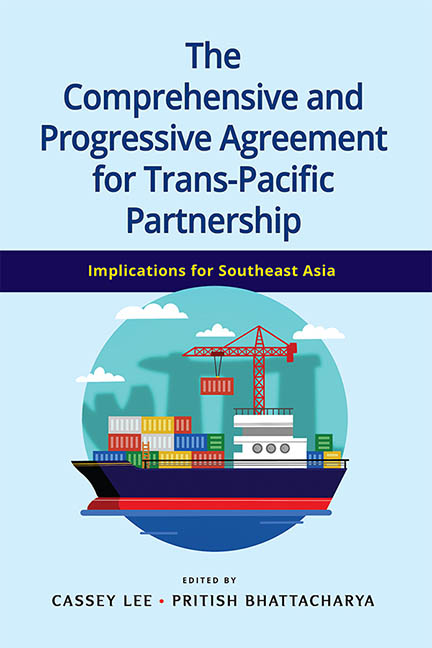Book contents
- Frontmatter
- Contents
- Preface
- Abbreviations
- About the Contributors
- 1 Introduction
- 2 The Economics of the CPTPP and RCEP: Asia Pacific Trade Agreements without the United States
- 3 The TPP and CPTPP: Truths about Power Politics
- 4 The Investment Chapter and ISDS in the CPTPP: Lessons from and for Southeast Asia
- 5 Intellectual Property in the CTPP and Access to Medicines A Thai Perspective
- 6 New Rules for State-Owned Enterprises in the CPTPP
- 7 Impact of the CPTPP on Japanese Manufacturing Affiliates in ASEAN
- 8 Reassessing Malaysia’s Export Opportunities in the TPP and CPTPP
- 9 Impact of the CPTPP on Vietnam
- 10 Should Thailand Join the CPTPP?
- 11 Indonesia, the TPP and CPTPP: Hold Your Breath
- Index
4 - The Investment Chapter and ISDS in the CPTPP: Lessons from and for Southeast Asia
Published online by Cambridge University Press: 08 October 2021
- Frontmatter
- Contents
- Preface
- Abbreviations
- About the Contributors
- 1 Introduction
- 2 The Economics of the CPTPP and RCEP: Asia Pacific Trade Agreements without the United States
- 3 The TPP and CPTPP: Truths about Power Politics
- 4 The Investment Chapter and ISDS in the CPTPP: Lessons from and for Southeast Asia
- 5 Intellectual Property in the CTPP and Access to Medicines A Thai Perspective
- 6 New Rules for State-Owned Enterprises in the CPTPP
- 7 Impact of the CPTPP on Japanese Manufacturing Affiliates in ASEAN
- 8 Reassessing Malaysia’s Export Opportunities in the TPP and CPTPP
- 9 Impact of the CPTPP on Vietnam
- 10 Should Thailand Join the CPTPP?
- 11 Indonesia, the TPP and CPTPP: Hold Your Breath
- Index
Summary
Introduction
The Trans-Pacific Partnership (TPP) free trade agreement (FTA) was signed on 4 February 2016. Prior to and following the signing of the TPP, significant media and public attention focused on its investment chapter, especially the investor-state dispute settlement (ISDS) provisions. For example, one report asserted: “Indonesia could fall into bankruptcy if the biggest market in Southeast Asia [joins the TPP], which would allow investors to sue the government in international arbitration courts through investor-state dispute settlements” (Jakarta Post, 15 February 2016). Yet a considerable proportion of additional economic growth modelled from the TPP was expected to come from more foreign direct investment (FDI) generated by liberalization commitments in that FTA (Petri and Plummer 2016).
Ratification of the TPP fell into doubt following newly-elected President Trump's withdrawal of signature by the United States in January 2017. But on 8 March 2018, the other eleven signatories (including four Southeast Asian states) re-signed the Comprehensive and Progressive Trans-Pacific Partnership (CPTPP). It made minimal changes to the original TPP's investment chapter and its ISDS provisions as well as loosening the requirements for this FTA to come into effect. Accordingly, there are practical and theoretical lessons to be drawn from the investment chapter and ISDS provisions in the agreement. For example, why were the Southeast Asian countries involved agreeable to ISDS? As the second section of this chapter outlines, ISDS-backed investment treaty commitments are already widespread across the Asia Pacific region (Bath and Nottage 2020). They have been offered in FTAs and earlier standalone bilateral investment treaties (BITs) signed by Southeast Asian states, the option to promote FDI especially where host states lack domestic laws and courts meeting international standards, which are current TPP signatories as well as potential new partners.
Other countries in the region that showed some interest in the TPP, such as Thailand, the Philippines and Indonesia (Crockett 2016), have each been subjected to a few arbitration claims brought by foreign investors and these countries consequently reviewed their approach to investment treaties and ISDS. Yet, until the end of 2016, none of them, and indeed no Southeast Asian state, had ever had to pay out on an arbitral award where the host state's consent to international arbitration has been given through an investment treaty. Nor has any Southeast Asian state declared that it would eschew ISDS completely in future treaties.
- Type
- Chapter
- Information
- Publisher: ISEAS–Yusof Ishak InstitutePrint publication year: 2021

